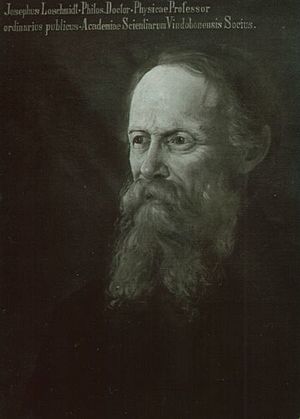Johann Josef Loschmidt facts for kids
Quick facts for kids
Johann Josef Loschmidt
|
|
|---|---|

Johann Josef Loschmidt
|
|
| Born | 15 March 1821 |
| Died | 8 July 1895 (aged 74) |
| Nationality | Austrian |
| Known for |
|
| Scientific career | |
| Fields | chemistry, physics |
| Doctoral advisor | Joseph Stefan |
Johann Josef Loschmidt (born March 15, 1821 – died July 8, 1895) was an important Austrian scientist. He made big discoveries in chemistry and physics, especially about how molecules work and how tiny things move. He was born in a town called Karlsbad, which is now Karlovy Vary in the Czech Republic. Later, in 1868, he became a professor at the University of Vienna.
Contents
Early Life and Learning
Josef Loschmidt had two important teachers who helped him a lot.
Adalbert Czech's Influence
His first helper was a priest named Adalbert Czech. This priest convinced Josef's parents to send him to a good high school. Josef went to a monastery school in Schlackenwerth. In 1837, he went to advanced classes in Prague.
Franz Serafin Exner's Mentorship
After high school, Josef studied philosophy and mathematics at Charles University in Prague. There, he met his second important teacher, Professor Franz Serafin Exner. Professor Exner had trouble seeing, so he asked Josef to read to him.
Professor Exner was known for making schools better. He believed that mathematics and science were very important subjects. He became a close friend to Josef. Exner suggested that Josef use math to understand how people think. This helped Josef become a very skilled mathematician.
Discoveries in Chemistry
Loschmidt lived during an exciting time for science. Scientists were just starting to understand how gases work, which is called the Kinetic Theory of Gases.
Drawing Molecules
In 1861, Loschmidt published a small book called Chemische Studien (which means "chemical studies"). In this book, he drew pictures of over 300 different molecules. His drawings looked a lot like the ones chemists use today!
He drew molecules like benzene (C6H6). For benzene, he used a large circle to show that its structure wasn't fully known yet. Some people think his circle drawing was actually a hint that benzene had a ring shape. This was four years before another famous chemist, Kekulé, is usually given credit for discovering benzene's ring structure.
Discoveries in Physics
Loschmidt also made big steps in understanding the tiny parts of matter.
Estimating Molecule Size
In 1865, Loschmidt was the first person to guess how big the molecules in the air are. His guess was incredibly close to the real size, even though he had to make some smart guesses!
His method helped scientists figure out how many molecules are in a certain amount of gas. This number is now called the Loschmidt constant in his honor. Today, we know that there are about 2.69 followed by 19 zeros (2.69 x 1019) molecules in one cubic centimeter of gas at standard conditions. That's a lot of molecules!
Loschmidt and Boltzmann
Loschmidt became good friends with a younger scientist named Ludwig Boltzmann. Boltzmann was trying to explain the second law of thermodynamics using how tiny particles move. This law talks about how things tend to become more disordered over time.
Loschmidt pointed out a problem with Boltzmann's idea, which became known as the "reversibility paradox". This challenge helped Boltzmann develop his famous idea of entropy. Entropy is a way to measure the disorder or randomness in a system.
Later Life
Loschmidt retired from the university in 1891. He passed away in 1895 in Vienna. His work helped lay the foundation for much of modern chemistry and physics.
See also
 In Spanish: Johann Josef Loschmidt para niños
In Spanish: Johann Josef Loschmidt para niños 
 | Ernest Everett Just |
 | Mary Jackson |
 | Emmett Chappelle |
 | Marie Maynard Daly |

